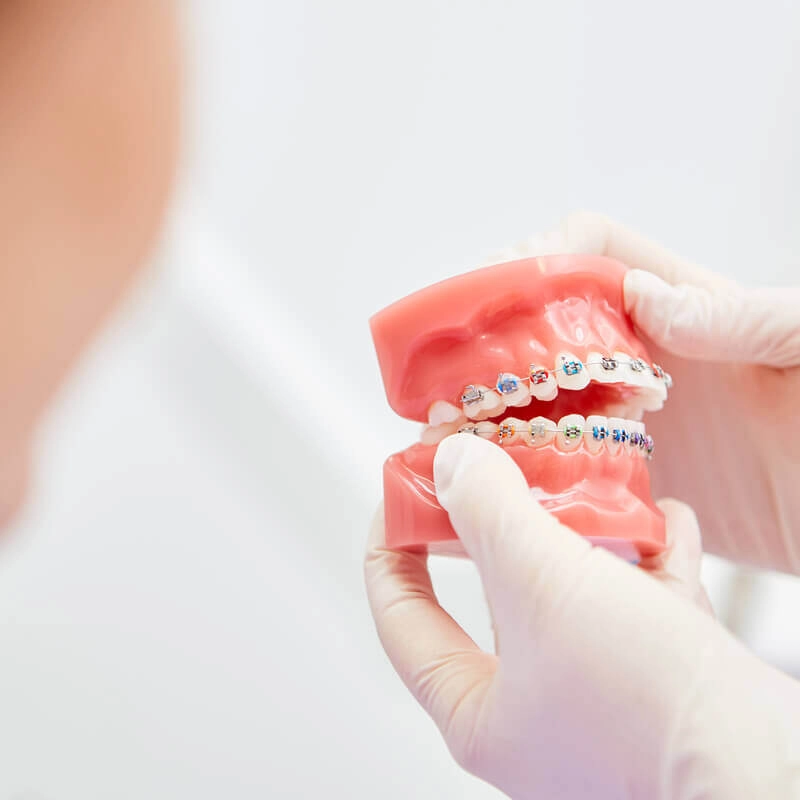Home/Wellness Zone/Sakra Blogs
22nd Feb, 2021

Everyone wants to have good dental health. While most of us do not face severe dental health problems, the majority of people face the problem of Malocclusion of Teeth.
What Is Malocclusion?
Malocclusion! You might have probably not heard of this term often (unless you hang out with orthodontists!). Malocclusion is nothing but the misalignment of teeth. It is a common musculoskeletal problem.
To put it in simpler terms - Your upper teeth are meant to fit slightly over your lower teeth, and the points of your upper molars fitting into the grooves of your lower molars. When this alignment doesn’t occur, the result is Malocclusion. For people suffering from severe malocclusion, it is difficult to perform basic functions like chewing or biting and moreover, it can affect their oral and digestive health too if left untreated.
To technically understand, Malocclusion means there is a deflection from the normal alignment of the teeth to other teeth in the same arch or to the teeth in the opposing arch.
Unlike periodontitis and dental caries, malocclusion is not a disease; most people experience malocclusions in some form due to genetic factors or poor oral hygiene.
Malocclusion is manifested in many ways - crowded teeth, crossbite, overbite, underbite and open bite.
Consult the dentist at Sakra World Hospital for malocclusion treatment in Bangalore.
Types of Malocclusion
1. Overcrowding
This is the most common type of Malocclusion. Smaller jaw size is the main reason for the overcrowding of teeth. This results in teeth that are crooked and overlapped.
2. Overjet
When the top teeth extend past the bottom teeth, horizontally, it is known as an overjet. People having an overjet face difficulty eating and while speaking.
3. Overbite
When the upper teeth extend past the bottom teeth by more than 2-3mm, overbite occurs. In some cases, it can cause the front teeth to bite down onto your gums!
4. Crossbite
Crossbites occur when the upper teeth are misaligned in a way that they bite or sit on the insides of the lower teeth.
5. Anterior crossbite (underbite)
Anterior crossbites happen when the lower front teeth extend beyond the upper front teeth, this is more commonly known as an underbite.
6. Spacing
All teeth are supposed to be adjacent to each other. Spacing can occur between two or more teeth due to missing teeth, small teeth, or thumb sucking.
7. Diastema
A diastema is just a single gap or space that occurs between two teeth, mostly the upper front teeth.
Impacted tooth
A tooth that has failed to erupt through the gum normally. This causes spacing issues for the surrounding teeth
Why is Misalignment of teeth a problem?
It can cause problems when you chew and speak
It can increase the risk of gum disease and tooth decay
It strains the jaws, and muscles, increasing the risk of tooth fracture or break
Can affect self-esteem and well-being
What Causes Malocclusion?
Malocclusion is usually a genetic predisposition. However, there are other causes too:
childhood defects like cleft palate
sucking of thumb and frequent use of a pacifier in children under the age of 4
prolonged use of bottle feeding in early childhood
Frequent or constant oral breathing
tumors in the mouth or jaw
lack of calcium and other nutrients
impacted teeth
poor dental care
Facial injury
Smaller jaw size can cause crowding
There could be other possible causes of Malocclusion, however, these are the ones that are most common.
What are the Symptoms of Malocclusion?
Depending on the type the symptom might be subtle or severe. The symptoms of malocclusion can include, but is not limited to:
visible irregular alignment of teeth
inability to chew food properly
biting the inner cheeks or tongue frequently
speech problems
change in the appearance of the face
breathing from the mouth instead of the nose
Diagnosing and Classifying Malocclusions
Routine dental examinations are the most common way by which dentists will be able to detect Malocclusion. Other examinations like X-rays will be conducted to check for the severity. Treatment will depend on the severity and classification of Malocclusion.
There are three major classes of malocclusion diagnosis:
Class 1
This is diagnosed when the upper teeth overlap the lower teeth. In this type of malocclusion, the overlap is slight and the bite is normal.
Class 2
This is diagnosed when a severe overbite is present. This means that the upper teeth and jaw significantly overlap the lower jaw and teeth.
Class 3
This is diagnosed when there’s a severe underbite. This condition is known as prognathism which means the lower jaw protrudes forward.
What is the treatment for Malocclusion?
Mild malocclusion does not require any treatment. However, if your case is severe you need to visit an orthodontist. Depending on your type of malocclusion, the orthodontist will recommend various treatments. These can include:
Braces (wired or clear aligners) to correct the position of the teeth
Removal of teeth to fix overcrowding
Bonding, reshaping, or capping of teeth
surgery to reshape the jaw
Use of the plates or wires to stabilize the jaw bone
Misaligned teeth are a common problem experienced by all ages. As mentioned earlier, minor alignment does not need attention and hence, the decision to correct misaligned teeth is a personal one. However, severe cases should not be disregarded as they can cause major complications to your health. At Sakra, our team of Orthodontists are trained to give you a beautiful, healthy smile at any age.
Looking for an orthodontist in Bangalore, then consult the Sakra World Hospital, the best dental hospital in Bangalore for the treatment of malocclusion.
HOD & SENIOR CONSULTANT- PERIODONTIST & LASER PRACTITIONER
Book an AppointmentEnquire Now
